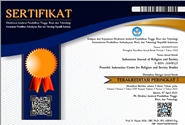Covid-19 Pandemic and Institutional Reconstruction Towards a New Normal Life
Abstract
New norms and social institutions have emerged in connection with the Covid-19 pandemic and in many ways have replaced the previously considered good order. The foreign phrase which is currently a term has been agreed upon by all parties as an invitation and a word of hope - new normal. Through literature study, this article reviews the fact that there have been institutional changes in various aspects of life because of the pandemic faced by the community for more than a year. By conducting a study of the results of research and internal monitoring of the Covid-19 Task Force and supported by secondary data, this article discusses three levels of social interaction structure that are interconnected and influence each other. At first the pandemic brought shocks that caused negative effects on almost all aspects of life, but in the course of time the difficult conditions gave various optimism to rearrange existing institutions to be more relevant to the contemporary context full of change. Doubts, incoherence, and weak aspects of government institutions are the cause of the continued spread of the pandemic. The legitimacy of the policy is the key to stopping the pandemic as well as institutional restructuring.
Keywords
Full Text:
PDFReferences
Adnan, R. S. (2006). Potret Suram Bangsaku: Gugatan dan Alternatif Disain Pembangunan. UI Press.
Anwar, M. C. (2020). Efek Dahsyat Covid-19, Hotel dan Restoran Rumahkan Pegawai. CNBC Indonesia. https://www.cnbcindonesia.com/news/20200313102518-4-144580/efek-dahsyat-covid-19-hotel-dan-restoran-rumahkan-pegawai
Ardyan, E., Kurniawan, D., Istiatin, I., & Luhgiatno, L. (2021). Does customers’ attitude toward negative eWOM affect their panic buying activity in purchasing products? Customers satisfaction during COVID-19 pandemic in Indonesia. Cogent Business & Management, 8(1). https://doi.org/10.1080/23311975.2021.1952827
Baum, T., Mooney, S. K. K., Robinson, R. N. S., & Solnet, D. (2020). COVID-19’s impact on the hospitality workforce – new crisis or amplification of the norm? International Journal of Contemporary Hospitality Management, 32(9), 2813–2829. https://doi.org/10.1108/IJCHM-04-2020-0314
Brinton, M. C., & Nee, V. (1999). The New Institutionalism in Sociology. In Social Forces (Vol. 77, Issue 4, p. 1694). Russell Sage Foundation. https://doi.org/10.2307/3005929
Gupta, J., Bavinck, M., Ros-Tonen, M., Asubonteng, K., Bosch, H., van Ewijk, E., Hordijk, M., Van Leynseele, Y., Lopes Cardozo, M., Miedema, E., Pouw, N., Rammelt, C., Scholtens, J., Vegelin, C., & Verrest, H. (2021). COVID-19, Poverty and Inclusive Development. World Development, 145, 105527. https://doi.org/10.1016/j.worlddev.2021.105527
Hamid, H. (2018). Manajemen Pemberdayaan Masyarakat. De La Macca.
Haryanto. (2021). Public Trust Deficit and Failed Governance: The Response to COVID-19 in Makassar, Indonesia. Contemporary Southeast Asia, 43(1), 45–52. https://pesquisa.bvsalud.org/global-literature-on-novel-coronavirus-2019-ncov/resource/en/covidwho-1279122
Humaedi, M. A., Purwaningsih, S. S., Sundary, L. V., & Fathy, R. (2021). Membangun Kegotongroyongan Dan Mengaktifkan Peran Kepemimpinan Lokal: Strategi Pentahelix Penanganan Dampak Covid-19. Jurnal Masyarakat Dan Budaya, 23(1), 39–58. https://doi.org/10.14203/jmb.v23i1.1203
Jewett, R. L., Mah, S. M., Howell, N., & Larsen, M. M. (2021). Social Cohesion and Community Resilience During COVID-19 and Pandemics: A Rapid Scoping Review to Inform the United Nations Research Roadmap for COVID-19 Recovery. International Journal of Health Services, 51(3), 325–336. https://doi.org/10.1177/0020731421997092
Kompas.com. (2020). Dampak Pandemi Covid-19, Pemerintah Akui Daya Beli Masyarakat Melemah. Kompas.Com. https://money.kompas.com/read/2020/10/06/050800026/dampak-pandemi-covid-19-pemerintah-akui-daya-beli-masyarakat-melemah
Meckelburg, R. (2021). Indonesia’s COVID-19 Emergency: Where the Local is Central. Contemporary Southeast Asia, 43(1), 31–37. https://doi.org/https://www.jstor.org/stable/10.2307/27035521
Nasional Kontan. (2021). KSPI Sebut Ada 50.000 Buruh Terkena PHK sejak awal 2021. Kontan.Co.Id. https://nasional.kontan.co.id/news/kspi-sebut-ada-50000-buruh-terkena-phk-sejak-awal-2021
Nee, V. (2010). The New Institutionalisms in Economics and Sociology. The Handbook of Economic Sociology, 49–74. https://doi.org/10.1515/9781400835584.49
Pradana, M., Rubiyanti, N., S., W., Hasbi, I., & Utami, D. G. (2020). Indonesia’s fight against COVID-19: the roles of local government units and community organisations. Local Environment, 25(9), 741–743. https://doi.org/10.1080/13549839.2020.1811960
Republika.co.id. (2021). KSPI Catat 50 Ribu Buruh Sudah Di-PHK Pada 2021. Republika.Co.Id. https://www.republika.co.id/berita/qyc3t2436/kspi-catat-50-ribu-buruh-sudah-diphk-pada-2021
Yahya, A. N. (2021). Dampak Pandemi, KSPI Sebut 50.000 Buruh Di-PHK sejak Awal 2021. Kompas.Com. https://nasional.kompas.com/read/2021/08/25/07424401/dampak-pandemi-kspi-sebut-50000-buruh-di-phk-sejak-awal-2021
DOI: https://doi.org/10.36256/ijrs.v3i2.243
Refbacks
- There are currently no refbacks.
Copyright (c) 2021 Indonesian Journal of Religion and Society

This work is licensed under a Creative Commons Attribution-NonCommercial 4.0 International License.
Indonesian Journal of Religion and Society (IJRS) Is Indexed By:

Indonesian Journal of Religion and Society (IJRS) is distribute under Creative Commons Attribution-NonCommercial 4.0 International License.













